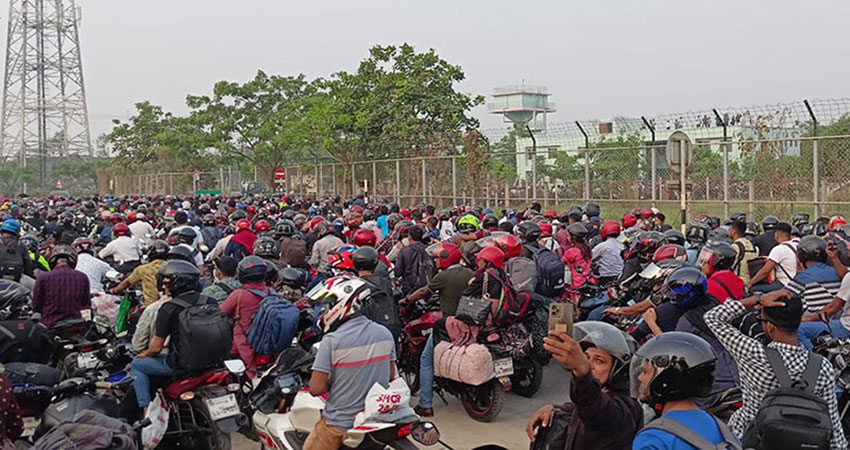Staff Correspondent:
The significant increase in the costs of kitchen commodities has become a major problem in Bangladesh, negatively impacting the lives of its citizens. The surging market prices have unquestionably caused difficulties for the general population, leading the new government to prioritize market price regulation as a primary objective.
This isn't just an economic issue; it's a complex social challenge affecting various aspects of citizens' lives. It is creating financial struggles for individuals, hindering their ability to maintain proper nutrition, access education, and maintain their overall well-being. This inflationary pressure hits low-income households the hardest, worsening existing societal inequalities.
Price regulation
Enforcing market price regulation becomes a moral duty for any government dedicated to protecting the welfare of its population. Ensuring the affordability of vital goods is a crucial element of social justice, guaranteeing that individuals of all economic backgrounds may achieve a satisfactory quality of life. Therefore, the new administration's will to address this matter is vital for fostering a more equitable and impartial society.
Although the desire to regulate market pricing is praiseworthy, it is crucial to recognize the inherent difficulties associated with such undertakings. The interplay of the worldwide economy, interruptions in supply chains, and unpredictable shifts in demand add to the intricacy of price regulation. Furthermore, any interference in the market must carefully maintain a delicate equilibrium to prevent unforeseen outcomes, such as scarcities or the suppression of competition.
To exert effective control over market pricing, the government must implement a comprehensive and nuanced strategy that considers the complexities of the supply chain, global market dynamics, and the varied requirements of its population. It is improbable that a solution that works for everyone will produce long-lasting outcomes, thus a policy framework that is both strategic and adaptable is necessary. Nipping out syndicates and middle-men
The Ministry of Commerce bears the crucial responsibility of dismantling the syndicate's influence across all levels. Undoubtedly, the far-reaching impacts of Covid-19 and the global economic downturn triggered by the Russia-Ukraine conflict have significantly affected commodity prices worldwide. However, despite these external factors, the domestic syndicate persists in manipulating market prices to reap excessive profits. Therefore, it is imperative to carry out mobile courts across the entire country to suppress this practice.
Furthermore, the government must tackle the impact of intermediaries in vegetable markets. Historically, in the winter season, the costs of seasonal vegetables tend to be reasonably priced for the general population. Nevertheless, this year has witnessed a substantial surge in the cost of potatoes, cauliflower, beans, eggplants, and other vegetables, despite ample supply. Producers are facing unfair pricing for their goods due to the dominance of middle-men syndicates, resulting in difficulties for customers. Hence, the government must intervene to dismantle these syndicates.
Improved infrastructure and facilities
The government needs to focus on building robust infrastructure for storing and transporting agricultural goods, aiming to reduce wastage and ensure a steady supply. At the same time, fostering better collaboration among farmers, wholesalers, and retailers is crucial for optimizing the efficiency of the entire supply chain. A transparent and technology-driven system is also vital for effectively monitoring and reporting commodity prices.
The State Minister of the ICT division has suggested the creation of a market monitoring app based on information technology. The competent body should take proactive measures to promptly launch and popularize the application. Furthermore, the government must implement rigorous measures to combat hoarding and speculative activity that exacerbate market price fluctuations. Implementing this diverse strategy is essential for guaranteeing a secure and open agricultural market system.
Although the present administration has increased the coverage of Social Safety Net (SSN) programs, there is still a need for targeted subsidies on necessary goods to minimize the impact on vulnerable groups. The government has engaged in actively helping the public by providing kitchen items at discounted costs through Open Market Sales (OMS). Broadening the range of OMS might also assist individuals requiring assistance. In addition, it is important to strengthen social safety nets to provide direct help to those who are most negatively impacted by rising costs. This will contribute to a more complete strategy for tackling the issues faced by the population.
International cooperation
Governments can strengthen cooperation with international organizations, forming partnerships that seek to stabilize global commodity prices and build beneficial trade agreements. The country can get advantages by actively participating in global institutions, as it allows them to access common knowledge, specialized skills, and collaborative endeavours, ultimately leading to a more stable and foreseeable commodities market. Utilizing diplomatic channels is crucial in negotiating equitable conditions for both imports and exports, promoting an environment of reciprocity and mutual advantage. By engaging in strategic international partnerships, governments may cultivate economic stability, advocate for equitable trade policies, and enhance the overall prosperity of nations involved in the global marketplace.
The process of implementing market price regulation in Bangladesh is intricate and demanding, but it is a necessary endeavour that requires steadfast dedication. The new government's focus on this matter is a positive move, and by adopting a well-planned mix of the outlined actions, it can establish a more secure and fair economic environment. Controlling market pricing goes beyond economic factors and demonstrates a government's commitment to the well-being and success of its citizens.



















